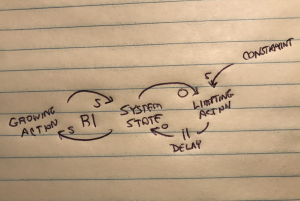In my Introduction to Acquiring and Creating the RIGHT Information article, the first method I presented was the “search” method. I followed that up with a more in-depth look at search in my The Right Information: Tips on Searching Beyond What Falls inn Your Lap post. Let’s now turn our attention to the next method I covered regarding gathering the right information — inquiry. Obviously, inquiry is all about asking the right questions, and certainly, asking the right people those questions.
As you recall, data is the collection of raw symbols (letters, numbers) that we collect and can see. Information is obtained by asking questions about that data. Normally, you don’t just download all the raw data and start scanning through that in hope of uncovering something. Yes, occasionally there is a place for that — for example, if you are reading through customer comments, employee comments, etc., that you have collected — but even then we have probably asked questions that generated that specific information. So, basically, the starting premise is that your first encounter with information is normally after you or someone else has “asked” one or more questions about data, and generated some report or collection of what you now call information.
Common Questions
Common questions asked in business are things like, “What is the current sales forecast?”, “How many units of this product have we sold?”, “What is our average sale?”, “What is the morale of our employees?”, “Which customers have we lost and why?”, “What is our competitor offering?”, “Which sales person is most productive?”, or “How much profit did we make?”. The fact is that in business, you ask questions every day. This seems easy enough, right?
It is certainly easy to ask a question. However, the first point of this post is to draw attention to the significance of asking the right questions. Asking the right questions requires that you (a) decide the most important things you need to know in order to be effective, (b) accept that you may have blind spots and find the missing questions that challenge the status quo, and (c) hear questions that others are asking or implying as they interact with you and your team.
The Right Questions
There are sets of questions that should be asked and answered within specific job functions, especially in leadership. What are the key performance indicators (KPIs) that you want to track to determine when and how you are successful or when you fall short? These KPIs are answers to questions in the form of charts, or reports, or feedback of some kind. The first step is ensuring that you as a leader, other leaders in your organization, and every member of the organization know what their own KPIs are and that they answer those questions regularly by tracking progress on those KPIs.
The next step in asking the right questions is harder. How do you find “missing” questions? How can you find what you don’t see or know? You challenge yourself to look at your business and situations from different perspectives. For example, if a sales rep draws your attention to a competitive product that has been launched in your market that is apparently eating away your market share, you will start by asking the common questions like “What are they offering?”, “How much does it cost?”, “Who is buying this?”, and “What do we have that competes with this?”. You might then move on to ask questions like, “How can we compete?”, “Should we lower our price?”, “Should we launch a similar product to compete?”, or “How can we position our product against this in order to show more value?”.
If you challenge yourself on the missing questions, you may start to ask questions like “Why is this product more attractive to our customers?”, “What value have they uncovered that we are missing?”, or “What would be a ‘next generation’ product that we could offer that would make this new competitive product obsolete or much less useful?”.
The last, but not least important, focus for asking the right questions lies in hearing questions that others are asking. What questions are your customers asking regularly? What questions are sales reps asking? What questions are you hearing, but not really addressing? It is important to become more aware of the types and frequency of questions that are asked from within and from outside your organization. For example, customer support may be telling you that customers are frequently asking about your payment terms. You have generally disregarded this because, well, that is just what the accounts receivables department dictates. On the other hand, this could be a point of leverage you may want to explore since customers are frequently asking about these terms. It is time to hear that question, start talking to customers about this, and start talking internally about how your business might be strategic in making those decisions.
Questions are indeed powerful, but the right questions are empowering.
Asking the Right People
When we do ask questions, who do we ask? First, let me address the fact that many business leaders are intuitive and lead using their intuition. I have had to recognize this in myself personally and work hard to both embrace the good and the bad in this trait. When a leader is fully immersed in a marketplace, many times that market knowledge and intuition is the primary driver of promotions and success. However, in order to take your leadership skills and success to a new level, you will need to recognize that challenging your intuition by asking questions is critical. With that challenge also comes the need to ask the right people questions.
Who are those people? Let’s start with customers. Do you and/or does your company regularly engage customers in ways where you can ask them questions? This can take on many forms such as:
- formal research
- on-demand surveys after product purchases
- formal and/or information questions from customer support
- interactions with technicians or installers
- interactions from the billing department
- social media interactions
- support or technical online forums
- specifically planned voice of the customer interviews where you sit down with specific customers and ask them questions
Customers, whether direct customers or indirect customers, should be a key target for questions and if you have no plan for asking questions and gathering, scoring, and discussing their answers, then you will pay a price for this in the future.
You should also be asking suppliers the right questions, if your business model relies on suppliers to fulfill key elements of your product and/or services. You don’t want surprises on the supply side.
What about investors? This sounds obvious, but the point is that many times investors are asking questions of your business or making statements about your business, but how much time do you spend asking them the right questions? Questioning investors may yield fruitful insight on their willingness to invest more, their view of the future of your business, what they really want you to deliver, a sense of timing for new ideas or requests for additional support.
A last example, but certainly not meant to limit your thinking on who to ask, would be your own employees. I find this area most significantly neglected in business. Many situations exist in business that are structured to ask questions to employees; however, these are usually pre-determined questions that are of the normal variety — things about profit, sales, progress on projects, budget cuts, etc., — but fewer opportunities are structured to ask the right kinds of questions that draw from the knowledge, experience, and ideas that employees may have within them. My suggestion is to ensure you structure time, and have others structure time, that leaves room to ask questions from employees about what they are thinking, what they are hearing, what they are observing, how things are working, what is not working, how things could be done differently, what new ideas they have seen that might work, what information they need, and of course, what questions they want to ask!
Talking is Just Easier
Talking is simply easier. Many leaders .. and probably most managers .. well, they love to talk and it gives them visibility and more exposure as a manager and/or leader. In a business where managers and leaders do most of the talking, and intuitively work their way through problems, the results will likely be predictable in many regards. However, for organizations that learn to ask the right questions to the right people, well, learning happens and new opportunity and innovation follows learning!
Final Note and Disclaimer
As I bring this article to a close, I want to clearly state that while addressing the notion of asking questions and asking the right people, I have not attempted to dig into the mechanics or science of research. Research is certainly at the heart of inquiry and proper research requires much attention to specific and very specialized areas such as:
- Wording of questions
- Types of questions
- Selection of groups
- Size of survey groups
- Measurement methodology
If you determine that more formal research is needed, and I would certainly say that if your business does ZERO formal research you are likely in jeopardy, then please note that consulting with or employing individuals trained in research will greatly increase your ability to execute meaningful research projects.
Next, I will address the third and last method that I put forward in finding the right information — observation.

